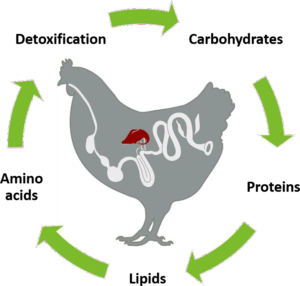The essential role of carnitine in poultry production
By-Melanie Frisch, product manager at Biochem Zusatzstoffe
Modern poultry breeds, both for meat and egg production, are trimmed for fast growth and high performance, insuring efficient production. A balanced nutrition is essential for utilizing the full potential of the animals and ensuring a healthy, sustainable development.
Chicken of both production types are faced with certain performance-related, metabolic challenges during their lifetime. Most nutrients and metabolic products are processed in the liver. This vital organ also plays a decisive role for fat metabolism. Supporting liver health is thus of great importance.
Especially the first two weeks of a chick’s life are marked by an intense growth rate, even more so in broilers than in layers. In addition to the feed ration, the energy deposits in the yolk sack, consisting largely of long chained fatty acids (LCFA), have to be metabolized into usable energy. The liver and lipid metabolism are burdened early on, limiting the full potential of the animals.
The challenges are present also in layer hens. Especially in older or caged animals, Fatty Liver Hemorrhagic Syndrome (FLHS) is a frequently observed, multifactorial metabolic disease. It is characterized by a general obesity of the animals. The liver becomes enlarged as excess fat accumulates inside the hepatocytes. In the beginning of the disease, the metabolism is slowed down and the liver burns fat less efficiently. In more advanced stages, the swelling of the organ may lead to hemorrhagic bleeding and increased mortality rates. The productivity and economy of the flock becomes affected.
In order to understand the steps leading up to these clinical symptoms, we need to take a closer look at the fatty acid metabolism. Fatty acids are metabolized via β–oxidation to create ATP, the universal energy source in the body. The needed

Figure 1: The liver is the central organ of metabolism. Disorders can quickly affect general health and performance, impairing feed conversion, weight gain and meat quality or laying performance.
https://www.pashudhanpraharee.com/role-of-rumen-protected-cholin-rpc-in-dairy-ration/
enzymes are located inside cell organelles called mitochondria. The transport mechanism for LCFA through the mitochondrial membranes limits the capacity of β–oxidation, creating a bottleneck effect. An enzyme, carnitine-acyltransferase 1, is responsible for this transport. Through a deficit in carnitine, the enzymes’ capacities become reduced.
When rearing under hot climatic conditions, the occurrence of FLHS is especially detrimental to a flock’s performance. To support the animals in heat stress conditions, feed rations are commonly adjusted with a higher fat content to increase the metabolizable energy content in the diet. Fat has a lower heat increment than carbohydrates or protein sources, thus helping the animals to mitigate the negative effects of heat stress.
Several studies have proven the beneficial effects of supplementing L-carnitine in poultry. In general, a supplementation could be useful in cases of metabolic burdens, such as heat exposure, or when energy demands are elevated. In broilers, positive effects are seen on body weight gain and feed
intake, especially in the early stages of growing. In layers, a decreased abdominal fat content and improved performance were demonstrated.
The product LiverPro is designed to support the metabolism of fatty acids: high amounts of L-carnitine increase the transport of LCFA into the mitochondria, leading to more available energy that can be put into growth and performance. It also helps in reducing plasma lipids and triglycerides in the liver. The included betaine and inositol provide further relief for energy metabolism. The addition of B vitamins supports the liver in various ways, they are needed as co-factors for several enzymes.
FLHS is often connected with a suboptimal energy-protein ratio. The quantity of essential amino acids limits protein synthesis. The addition of lysine and methionine through a supplementation with LiverPro helps to balance this ratio and supports performance.
In consequence, LiverPro is the right choice to strengthen liver metabolism. It can be administered easily and as needed via the drinking water. Layer and breeder hens benefit especially at the start and end of the laying period, where the metabolic challenge is highest. Broiler chicks are best supported in the first phase of intensive growth.


